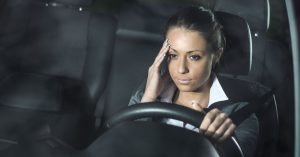Parents: Does Your College Student Think Drowsy Driving is Dangerous?

A new study shows college students are engaging in drowsy driving and do not consider it to be as dangerous as texting while driving and operating under the influence.
As a parent, you have probably talked to your college student about the risks of drunk driving and texting while driving on many occasions. What about drowsy driving? A new study reports college students are not taking this risk as seriously – even as drowsy driving causes an estimated 300,000 traffic crashes each year in the U.S.
The study was published in the February edition of the journal Sleep Health. Researchers conducted four focus groups involving 26 undergraduate students in 2016. Students were asked about their driving behaviors and perceptions about dangerous driving.
Most of the students considered themselves safe drivers, yet they viewed drowsy driving as less risky than operating under the influence of alcohol and distracted driving. Students actually said drowsy driving was “normal” and an “unavoidable part of their lives.” They admitted to drowsy driving in the past. Whether as a driver or passenger, many had actually been in some way involved in a drowsy driving car crash or near accident. In most cases, students were driving alone in the early morning or at night.
Researchers asked students how to reverse this trend. Students saw hope in creating public awareness campaigns for social media and billboards. Students supported the creation of materials which showed emotional portrayals of accidents and the impact of sleep deprivation on driving in different stages.
But researchers noted the biggest deterrent may be fear. Students said they would change their ways if they were stopped by a police officer.
This was a small study of just 26 students. But past studies have showed similar and even stronger results. Another 2016 study of 450 college students reported more than 70 percent of students had driven drowsy, including 40 percent in the past year and 30 percent in the last month.
Driving While Drowsy in Massachusetts
Massachusetts has worked to address the problem of young drivers operating while fatigued through its Junior Operator Law. Passed in 2007, the Junior Operator Law places certain restrictions on new drivers who are 16 1/2 to 18 years old. Unless they are with a parent, junior operators are not allowed to drive between 12:30 a.m. and 5 a.m.
Massachusetts lawmakers have tried to pass a law establishing a drowsy driving prevention week (a few other states have already passed these laws).
Just two states – Arkansas and New Jersey – have specific laws creating criminal penalties for fatigued driving, if police can meet the burden of proof. Drowsy driving can be a challenge for law enforcement – and lawyers – to prove. Drivers can wake up quickly with the red and blue lights of a police car. And there is no breathalyzer for a sleepy driver.
In Massachusetts, drivers who fall asleep behind the wheel may be cited for a related traffic violation if they cause an accident, such as a marked lanes violation if they cross the yellow line after dozing off. Drivers who fall asleep behind the wheel can also be held responsible in a civil lawsuit and have to pay damages if someone is injured or killed.
Do everything you can to prevent a drowsy driving accident. Talk to your college student and help them manage their sleep. Do the same for yourself and only drive when you are rested.
About Breakstone, White & Gluck
The Boston car accident attorneys at Breakstone, White & Gluck are experienced in representing drivers who have been seriously injured in car accidents and truck crashes. We represent those injured in crashes in Boston and nearby in Cambridge, Arlington, Waltham, Lexington and Watertown.
If you have been injured, learn your legal rights for seeking compensation. For a free legal consultation, call 800-379-1244 or use our contact form.

